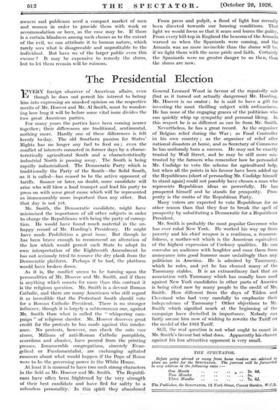The Presidential Election
IFVERY foreign observer of American affairs, even though he does not permit his interest to betray him into expressing an unasked opinion on the respective merits of Mr. Hoover and Mr. Al Smith, must be wonder- ing how long it will be before some vital issue divides the two great American parties.
For many years the parties have been coming nearer together ; their differences are traditional, sentimental, nothing more. Hardly one of these differences is felt keenly to-day. The old Southern passion for States' Rights has no longer any fuel to feed on ; even the conflict of interests connoted in former days by a charac- teristically agricultural South and a characteristically industrial North is passing away. The South is being rapidly industrialized. The Democratic Party which is traditionally the Party of the South—the Solid South, .as it is called—has ceased to be the active opponent of tariffs. Sooner or later, no doubt, some candidate will arise who will blow a loud trumpet and lead his party to press on with some great cause which will be represented as immeasurably more important than any other. But that day is not yet.
Mr. Smith, the Democratic candidate, might have minimized the importance of all other subjects in order to charge the Republicans with being the party of corrup- tion. He would have found much material in the un- happy record of Mr. Harding's Presidency. He might have made Prohibition a great issue. But though he has been brave enough to recommend an alteration of the law which would permit each State to adopt its own interpretation of the Eighteenth Amendment he has not seriously tried to remove the dry plank from the Democratic platform. Perhaps if he had, the platform would have broken down.
As it is, the conflict seems to be turning upon the personalities of Mr. Hoover and Mr. Smith, and if there is anything which counts for more than this contrast it is the religious question. Mr. Smith is a devout Roman Catholic, and there are many Americans who still regard it as incredible that the Protestant South should vote for a Roman Catholic President. There is no stronger influence, though it is largely a, subterranean one, against Mr. Smith than what is- called the " whispering cam- paign " of religious slander. Mr. Hoover deserves great credit for the protests he has made against- this intoler- ance. No protests, however, can check the sotto voce storm. Millions of anti-Roman Catholic pamphlets, scurrilous and abusive, have poured from the printing presses. Innumerable congregations, sincerely Evan- gelical or Fundamentalist, are exchanging agitated rumours about what would happen if the Pope of Rome were to be the governing power in the White House.
At least it is unusual to have two such strong characters in the field as Mr. Hoover and-Mr. Smith. The Republi- cans have often been frightened by the very strength of their best candidate and have fled for safety to a colourless perionalitY..- in this .spirit they abandoned General Leonard Wood in. favour of the reputedly safe (but as it turned out actually dangerous) Mr. Harding. Mr. Hoover is no orator ; he is said to have a gift for investing the most thrilling subject with ordinariness. He has none of the engaging graces of the politician who can quickly whip up sympathy and personal liking. In this respect he is as different as can be from Mr. Smith.
Nevertheless, he has a great record. As the organizer of Belgian relief during the War ; as Food Controller in his own country ; as the organizer of relief after national disasters at home, and as Secretary of Commerce he has uniformly been a success. He may not be exactly trusted by Wall Street, and he may be still more mis- trusted by the farmers who remember how he persuaded Mr. Coolidge to veto the scheme for agricultural help, but when all the points in his favour have been added up the Republicans (short of persuading Mr. Coolidge himself to stand again) could not possibly have chosen a man who represents Republican ideas so powerfully. He has prospered himself and he stands for prosperity. Pros- perity is the motto of the Republican Party.
Many voters are expected to vote Republican for no other reason than that they fear to break the spell of prosperity by substituting a Democratic for a Republican President.
Mr. Smith is probably the most popular Governor who has ever ruled New York. He worked his way up from poverty and his chief weapon is a readiness, a resource- fulness, a mother-wit which is the American equivalent of the highest expression of Cockney qualities. He can convulse an audience with laughter and coax' them from annoyance into good humour more unfailingly than any politician in America. He is admired by Tammany, which he rules, and yet he has cleaned many of the Tammany stables. It is an extraordinary fact that an association with Tammany which has usually been used against New York candidates in other parts of America is being cited now by many people to the credit of Mr. Smith. How different from the days of Tilden and Cleveland who had very carefully to emphasize their independence of Tammany ! Other objections to Mr. Smith which signified much at the beginning of the campaign have dwindled in importance. Nobody can fairly accuse him now of wishing to rewrite the Tariff on the model of the 1913 Tariff. • - Still, the real question is not what ought to count in Mr. Smith's favour but what does. Apparently his chance against his less attractive opponent is very small.






























































 Previous page
Previous page